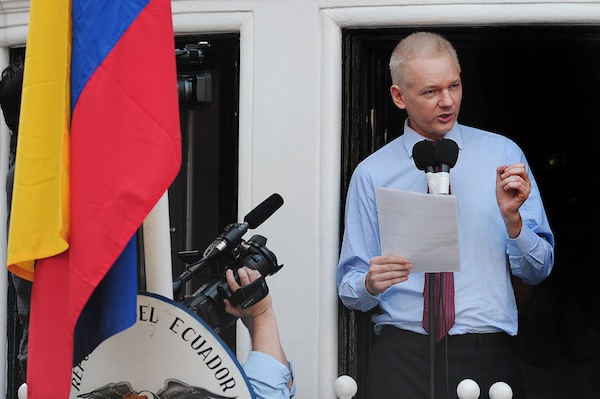Julian Assange appeared in public for the first time in two months this afternoon to make a statement about his continuing resistance to attempts to extradite him.
The Wikileaks founder made a number of claims and arguments which it’s useful to have a look at in further detail:
1. ‘If the UK did not throw away the Vienna conventions the other night, it was because the world was watching’.
Foreign Secretary William Hague has insisted that there are no plans to ‘storm’ the Ecuadorian embassy to arrest Assange. Either officers will attempt to arrest him when he leaves the building for Ecuador (although there is an interesting theory he may try to do this disguised in some sort of package, as diplomatic parcels cannot be examined by the police. Let’s see how well that one works out…), or the government will revoke the status of the embassy using the Diplomatic and Consular Premises Act 1987, which will be a lengthy process subject to judicial review by Ecuador.
2. He warned that the US could drag us all into a ‘dangerous and oppressive world in which journalists fall silent under the fear of prosecution’.
This is an interesting warning to make from the balcony of the Ecuadorian embassy, given the climate that country’s journalists find themselves working in.
3. The one thing Assange did not mention… the allegations against him.
Two women, who are understood to be supporters of Wikileaks, have made allegations against Assange which relate to incidents in Sweden in August 2010. The charges he is now wanted on are that Assange committed ‘unlawful coercion’ by holding the first complainant down with his body weight in a sexual manner; that he refused to wear a condom with the same woman when she had insisted he do so; that he ‘deliberately molested’ the same woman; and that he had sexual intercourse with the second complainant while she was asleep and when he was not wearing a condom.
But Assange’s speech didn’t actually mention Sweden: it focused on America, urging the US to drop its investigation into Wikileaks and highlighting the case of Bradley Manning, the private arrested in 2010 on suspicion of passing classified material to Assange.
He focused on the US because he fears he will be extradited from Sweden to face charges in an American court. There is currently no charge against Assange in the US, though. Sweden has already given assurances that its laws prevent it from extraditing someone to face a possible death penalty, which is something Assange and his supporters cite regularly.
P.S. It was, of course, a complete accident, that the Foreign Office website was running a feature about people falling off balconies right next to its Assange coverage…








Comments